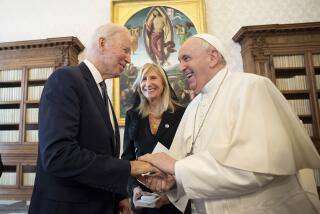Father John Hotchkin; Leader in Catholic Pursuit of Ecumenism
- Share via
WASHINGTON — Father John Hotchkin, a principal leader since the late 1960s in the American Catholic Church’s elusive pursuit of unity among Christian denominations, died of a bronchial infection Sunday at his Washington home. He was 66.
Over the years, Hotchkin had been a representative to talks with a kaleidoscope of faiths in the United States, from Mormons and Muslims to Jews and evangelical Christians. Though the overtures often resulted in only small gains, if any, Hotchkin was known as always nudging leaders on to the next meeting with a public face of optimism.
For example, in 1979, he told a group of Lutheran officials, “The day is coming near when we’re going to dance together.”
Since 1971, Hotchkin had been executive director of the Secretariat for Ecumenical and Interreligious Affairs of the National Conference of Catholic Bishops in Washington.
In that capacity, working for the bishops and watched closely by Rome, he represented the church in accords and other interchanges from the 1970s to the 1990s with Anglicans, Orthodox Christians and the Disciples of Christ. Most of the successes he and the American Catholic Church had came with mainline Protestant groups, while many evangelical and fundamentalist denominations were more reluctant to embrace the idea of ecumenism.
“Jack was a proponent of ego disarmament,” said Robert Edgar, general secretary of the National Council of the Churches of Christ in the U.S.A. “He recognized that Jesus wasn’t a Baptist or a Roman Catholic or a Methodist or a Lutheran.”
Hotchkin’s work often involved laying the behind-the-scenes groundwork and undertaking research for meetings among church leaders on sometimes obscure doctrinal issues.
He worked, for instance, on talks with major Lutheran denominations in the United States that helped lay the theological foundation for a historic 1999 declaration in Augsburg, Germany.
That consensus--between the Lutheran World Federation and the Catholic Church--was a major step toward laying to rest the dispute over “justification” that triggered the Protestant Reformation. The declaration said there existed a “common understanding” that faith was required for salvation, though it was taught in different ways by each denomination, meaning that earlier condemnations of the other’s position no longer applied.
Hotchkin was raised in the Lutheran farm community of Mokena, Ill., about 30 miles southwest of Chicago, where as a Catholic he learned about ecumenism at an early age. He studied at the North American College in Rome, where he was ordained in 1959. He was a parish priest in Chicago in the 1960s before returning to Rome on the heels of the Second Vatican Council.
The idea of ecumenism emerged from the council, and Hotchkin studied the subject in the 1960s at the Pontifical Gregorian University, from which he eventually received a doctorate.
He came to Washington in 1967 to work with the bishops conference. Over the years, he held several titles, originating both from the bishops conference and from Rome. Hotchkin served on the U.S. Faith and Order Commission, the Lutheran-Catholic Commission and the Anglican-Roman Consultation.
In recent years, he had been involved in sensitive talks to create an ecumenical group made up of members of the National Council of Churches, Catholics and evangelicals. Those talks had been complicated by recent disagreements among Protestant denominations.
Survivors include his mother, Sarah Hotchkin of Crete, Ill., and four sisters.
More to Read
Sign up for Essential California
The most important California stories and recommendations in your inbox every morning.
You may occasionally receive promotional content from the Los Angeles Times.










